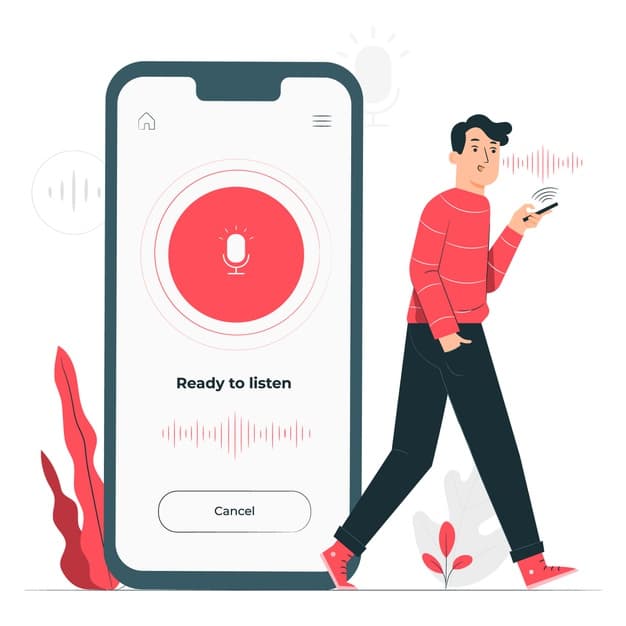A full service digital marketing agency and web design firm located in Scottsdale, Arizona.
1-877-347-3376
Email: info@spmarketingexperts.com
SP Marketing Experts
9903 E. Bell Rd., Suite #120-B Scottsdale AZ 85260
Voice Search Optimization
Search is becoming more convenient with each passing year. In recent years, search engine providers like Google and smart speakers have enabled users to conduct searches with their voices.
It’s not uncommon nowadays for people to press the mic button on a Google search bar to search for something instead of typing in their query. Frankly, voice search is more convenient than traditional search.
As this trend continues, more businesses will be forced to adapt their search engine optimization (SEO) strategies to include voice search optimization tactics. This guide will entail comprehensive voice search optimization techniques, as well as break down the term for you to understand.

What is Voice Search?
Voice search is the process of researching a query or keyword by speaking instead of typing. Generally speaking, any queries that are searched using a person’s voice is defined as voice search, whether the conduit is a smart speaker or cell phone.
Voice search has been a growing trend for several years. Google started the trend by allowing users to conduct online searches with their voices back in 2012. Now, voice search has emerged as a popular and convenient method of using the internet.
Mainly, voice search is used to ask detailed questions. For example, one may use voice search if they wanted to ask the question, “what is the most delicious baked chicken recipe?”
Without doing a lot of typing, asking long questions becomes convenient with voice search. In fact, it’s a trend that is showing no signs of slowing down any time soon.
Why is Voice Search Important?
It may be hard to believe, but the world wide web is more than 30 years old. The internet itself is over 50 years old. Over time, many generations have used the internet and search engines.
Traditionally, people have become accustomed to typing out their search queries. As the world transitions to the age of Millennials and Gen Zers, this may change. Many widely-accepted studies have shown that Millennials value convenience.
Furthermore, they are more open to using technology that makes their lives easier. Voice search, in itself, provides that level of convenience for younger generations. Therefore, if you want to brainstorm a more effective way of reaching today’s audience, optimizing your website for voice search is ideal.
However, don’t take our word for it. There are countless statistics that prove that the impetus of voice search is growing tremendously.
Voice Search Statistics
Voice search is developing into a trend you can’t ignore. Here are the following statistics regarding voice search’s impact on search engines.
- 27% of the global population uses voice search. (Google)
- 8 million people, or ⅓ of the U.S. population, uses a voice assistant every month. (eMarketer)
- In 2020, more than half of all smartphone users use voice search technology. (ComScore)
- 30% of all internet sessions will include voice search by at least 2020. (Gartner)
- Over half of all adults have used voice search, with 33% of them using it monthly. (Voicebot)
- 1 in 6 Americans own a smart speaker, an essential voice search device. (NRP and Edison Research)
- 25% of American homes that have Wi-Fi own a smart speaker. (Nielson)
- 58% of consumers used voice search to find local businesses in 2017. (BrightLocal)

As you can see, voice search is used in a variety of ways by millions of people across the world. There is no denying that you will eventually (if not now) integrate voice search into your overall search engine optimization (SEO) strategy.
If you’ve already decided to do so, here are some effective ways you can leverage voice search to lead increased traffic to your website and convert more qualified leads.
Optimize for Rich Answers
Most people who use smart speakers or a voice assistant to conduct a voice search ask very detailed questions. Some may be experiencing some type of illness and want to ask questions about symptoms.
Others may have questions about particular products or local services and need a thorough answer. Whatever the case may be, you should optimize your website to contain rich answers to these questions.
One of the best ways to do this is to have a frequently asked questions (FAQs) section somewhere on your website, preferably on a landing page. FAQs can easily list popular questions that are asked online and even keywords.
Below, you can list the answers to these FAQs to boost the ranking of your landing page and increase the chances of your answers being quoted during a voice search. That is the entire point of optimizing for voice search.
Ideally, you’ll want your website to obtain a rich snippet, as this is the first thing seen when a person conducts a voice search. This will be discussed later. For now, let’s discuss how you can revamp your content to accommodate your new voice search strategy.

Restructure Your Content
Content is the driving force of any website. Google’s ranking algorithms pay great attention to the content you have on your site. In order to show up for more voice-related queries, you’ll need to restructure your content completely.
This includes both the web copy on your site and any blogs and marketing collateral. In the previous section, adding a FAQs section was discussed. However, this isn’t the only method of creating voice-friendly content.
For web copy, try to include long-tail keywords (this will be discussed later) and answer a lot of popular questions without making it sound overly-contrived. Web copy is supposed to flow naturally.
Let’s include a simple example of how to include a voice-related question in web copy. Let’s say that you sell organic leather products using humane methods. In your web copy, you can write something along the lines of “we know you may be wondering if there are any companies that use humane methods to obtain leather.”

This is an example of a type of question someone may ask using a voice speaker, and it’s very possible to structure your content to make it flow and sound natural. Nonetheless, this isn’t the only way you should reimagine your content.
Here is another way you can make your content best-suited for voice-related queries.
Use Conversational Language
This section will talk mainly about blogs and any other marketing collateral, as web copy was already covered. Many websites take a professional approach to crafting online content.
This entails writing informative content that reads something like an encyclopedia entry. If you want to optimize your content for voice search, you’ll need to ditch this strategy entirely.
Instead, use conversational language in your content. The reason is that many voice queries are conversational and even include slang. This doesn’t mean that you have to put forth content that reads like the script of a music video, but it does mean you should eliminate any technical verbiage from your website.
Websites that strike a conversational and down-to-earth tone are more likely to show up for voice-related searches. If you want to receive an example of a marketer who uses conversational language on their website, look no further than Niel Patel.
Patel is one of the most intelligent marketers in the world, yet he breaks down complicated concepts in a way a third-grader can understand. His simple to read content regularly receives rich snippets, which are used by voice assistants and smart speakers anytime someone asks a related question.
Patel is a master of the art of conversation, and in a few tries, you can be a master too.
Target Long-Tail Keywords
Here comes the moment of truth. Keyword research! Keyword research is the cornerstone of any SEO strategy, so it makes sense that it would be important in voice search as well.
With that said, you should focus your efforts on performing detailed keyword research on long-tail keywords. These keywords are longer than standard ones. Also, some are more conversational than their shorter and more technical sisters.
Any term a person uses to conduct a voice search will be a long-tail keyword. This is a fact because a person wouldn’t search for “weather news” using a smart speaker. They can simply type that out.
They may, instead, ask “what is the weather looking like in Seattle?”
For this reason, increase your usage of long-tail keywords so your website can show up for more voice-related queries.

Leverage Your Google My Business Listing
If you run a local business, then you should definitely take everything in this section into account. In a large consumer study that can be found in the voice search statistics section, BrightLocal proved that 58% of consumers used voice search to find local businesses.
This is a big deal considering that voice search typically pulls data from a Google My Business (GMB) listing any time a person asks, “where is the nearest pizza place?” As a result, make sure you have a verified GMB listing and that all of your information is correct to receive an incoming stream of leads from voice search platforms.
Conclusion
Voice search should be a part of your existing SEO strategy. By reading this guide, you will have all of the tools to improve your overall marketing strategy for diverse search methods.
In the next post, obtaining rich snippets will be discussed, as we will show you how you can boost your ranking in a very simple manner.

Next in Series: Optimization for Featured Snippets
Reviews
I use SP Marketing for a number of things but I have to mention how useful it’s been having them help with Google Pay per click management. This company is fantastic at what they do. They are on top of everything and they are always so professional. I really don’t know what I would do without them. If you need any kind of digital marketing help this is the first place I would recommend. They put a lot of emphasis on customer care and they have really helped my business grow.
We hired SP Marketing to run online and social media ads for our company. I wasn’t really sure what to expect but decided it was worth a shot. The uptick in sales has been wonderful. These guys really know what they’re doing and their ads have brought us so many new customers. I’m so thankful. I highly recommend them.
I just love SP Marketing Experts. I needed some major help with link and citation building and these guys were able to handle everything for me. Their services have been so useful. I can't remember the last time I worked with a company that had such great customer service. If you're looking for any kind of digital marketing help for your company this is the first and only company I would recommend.
SP Marketing helped us completely redo our website. The old one was such a mess and we needed so much help. The end result was modern, easy to read, and very user friendly. I couldn’t be happier with their services. They did such a great job for us. I would 100% recommend them to anyone who has a business and needs website or marketing help. They do a fantastic job. They really delivered for us.
In order to stay competitive as a business you have to be regularly posting on social media. However, I own a small business and managing my own social media while I’m trying to run a company isn’t really productive. Thankfully, I found SP Marketing. They have been great. They do all of our social posts for us so that I don’t have to worry about it. It’s really helped the business grow. They are very professional and very easy to work with. I don’t know what I did without them.
I use SP Marketing for a number of things but I have to mention how useful it’s been having them help with Google Pay per click management. This company is fantastic at what they do. They are on top of everything and they are always so professional. I really don’t know what I would do without them. If you need any kind of digital marketing help this is the first place I would recommend. They put a lot of emphasis on customer care and they have really helped my business grow.
We hired SP Marketing to run online and social media ads for our company. I wasn’t really sure what to expect but decided it was worth a shot. The uptick in sales has been wonderful. These guys really know what they’re doing and their ads have brought us so many new customers. I’m so thankful. I highly recommend them.
I just love SP Marketing Experts. I needed some major help with link and citation building and these guys were able to handle everything for me. Their services have been so useful. I can't remember the last time I worked with a company that had such great customer service. If you're looking for any kind of digital marketing help for your company this is the first and only company I would recommend.
SP Marketing helped us completely redo our website. The old one was such a mess and we needed so much help. The end result was modern, easy to read, and very user friendly. I couldn’t be happier with their services. They did such a great job for us. I would 100% recommend them to anyone who has a business and needs website or marketing help. They do a fantastic job. They really delivered for us.
In order to stay competitive as a business you have to be regularly posting on social media. However, I own a small business and managing my own social media while I’m trying to run a company isn’t really productive. Thankfully, I found SP Marketing. They have been great. They do all of our social posts for us so that I don’t have to worry about it. It’s really helped the business grow. They are very professional and very easy to work with. I don’t know what I did without them.
I use SP Marketing for a number of things but I have to mention how useful it’s been having them help with Google Pay per click management. This company is fantastic at what they do. They are on top of everything and they are always so professional. I really don’t know what I would do without them. If you need any kind of digital marketing help this is the first place I would recommend. They put a lot of emphasis on customer care and they have really helped my business grow.
We hired SP Marketing to run online and social media ads for our company. I wasn’t really sure what to expect but decided it was worth a shot. The uptick in sales has been wonderful. These guys really know what they’re doing and their ads have brought us so many new customers. I’m so thankful. I highly recommend them.
I just love SP Marketing Experts. I needed some major help with link and citation building and these guys were able to handle everything for me. Their services have been so useful. I can't remember the last time I worked with a company that had such great customer service. If you're looking for any kind of digital marketing help for your company this is the first and only company I would recommend.
SP Marketing helped us completely redo our website. The old one was such a mess and we needed so much help. The end result was modern, easy to read, and very user friendly. I couldn’t be happier with their services. They did such a great job for us. I would 100% recommend them to anyone who has a business and needs website or marketing help. They do a fantastic job. They really delivered for us.
In order to stay competitive as a business you have to be regularly posting on social media. However, I own a small business and managing my own social media while I’m trying to run a company isn’t really productive. Thankfully, I found SP Marketing. They have been great. They do all of our social posts for us so that I don’t have to worry about it. It’s really helped the business grow. They are very professional and very easy to work with. I don’t know what I did without them.
I use SP Marketing for a number of things but I have to mention how useful it’s been having them help with Google Pay per click management. This company is fantastic at what they do. They are on top of everything and they are always so professional. I really don’t know what I would do without them. If you need any kind of digital marketing help this is the first place I would recommend. They put a lot of emphasis on customer care and they have really helped my business grow.
We hired SP Marketing to run online and social media ads for our company. I wasn’t really sure what to expect but decided it was worth a shot. The uptick in sales has been wonderful. These guys really know what they’re doing and their ads have brought us so many new customers. I’m so thankful. I highly recommend them.
I just love SP Marketing Experts. I needed some major help with link and citation building and these guys were able to handle everything for me. Their services have been so useful. I can't remember the last time I worked with a company that had such great customer service. If you're looking for any kind of digital marketing help for your company this is the first and only company I would recommend.
SP Marketing helped us completely redo our website. The old one was such a mess and we needed so much help. The end result was modern, easy to read, and very user friendly. I couldn’t be happier with their services. They did such a great job for us. I would 100% recommend them to anyone who has a business and needs website or marketing help. They do a fantastic job. They really delivered for us.
In order to stay competitive as a business you have to be regularly posting on social media. However, I own a small business and managing my own social media while I’m trying to run a company isn’t really productive. Thankfully, I found SP Marketing. They have been great. They do all of our social posts for us so that I don’t have to worry about it. It’s really helped the business grow. They are very professional and very easy to work with. I don’t know what I did without them.
Statistical Performance Marketing
Statistical Performance Marketing is a full service digital marketing agency and web design firm located in Scottsdale, Arizona.
1-877-347-3376
Statistical Performance Marketing
www.spmarketingexperts.com
9903 E. Bell Rd., Suite #120-B
Scottsdale
AZ
85260
Statistical Performance Marketing is a digital marketing agency and web design firm specializing in a variety of online marketing channels. Since our founding in 1999, it has been our goal to help all businesses run more efficiently and effectively online with outreach and remarketing campaigns. Combined, our team of designers, developers, and marketing experts have over 40 years of experience and an ever-growing drive for success.
© 2023 Statistical Performance Marketing | All rights reserved




